Unit 2 Katie always gets up early. 课件 (共22张PPT 内嵌音频)
文档属性
| 名称 | Unit 2 Katie always gets up early. 课件 (共22张PPT 内嵌音频) |

|
|
| 格式 | pptx | ||
| 文件大小 | 9.4MB | ||
| 资源类型 | 试卷 | ||
| 版本资源 | 湘少版 | ||
| 科目 | 英语 | ||
| 更新时间 | 2021-08-17 16:11:12 | ||
图片预览


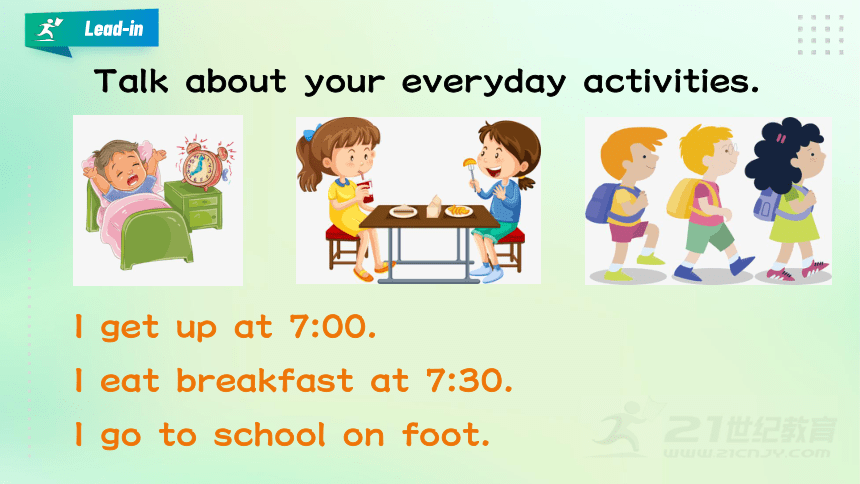
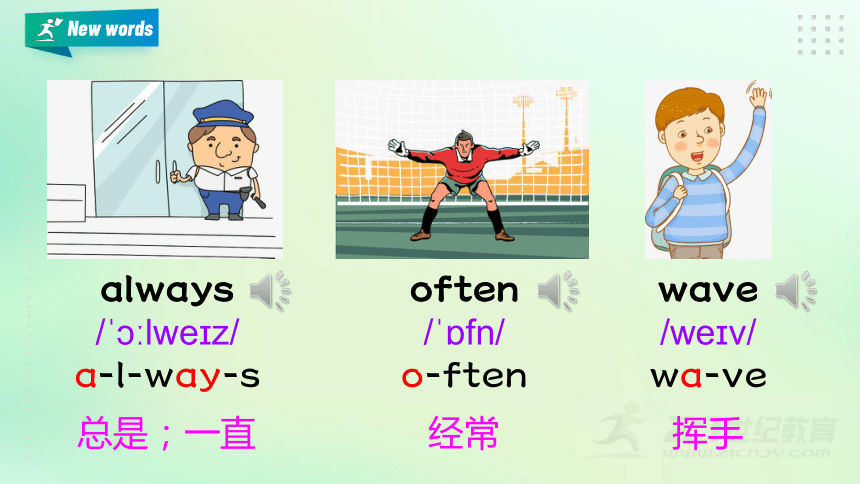
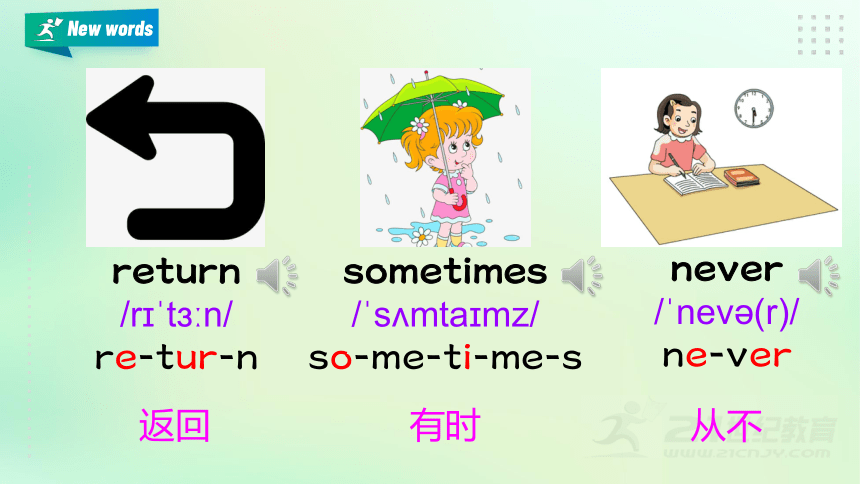

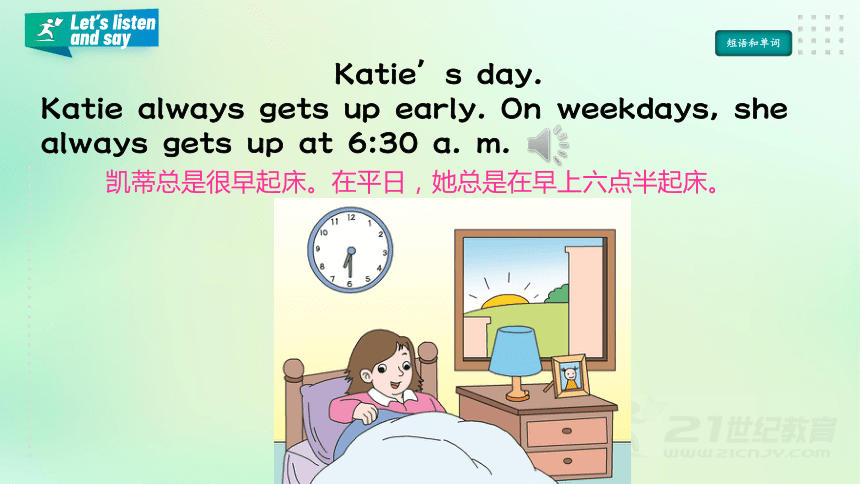
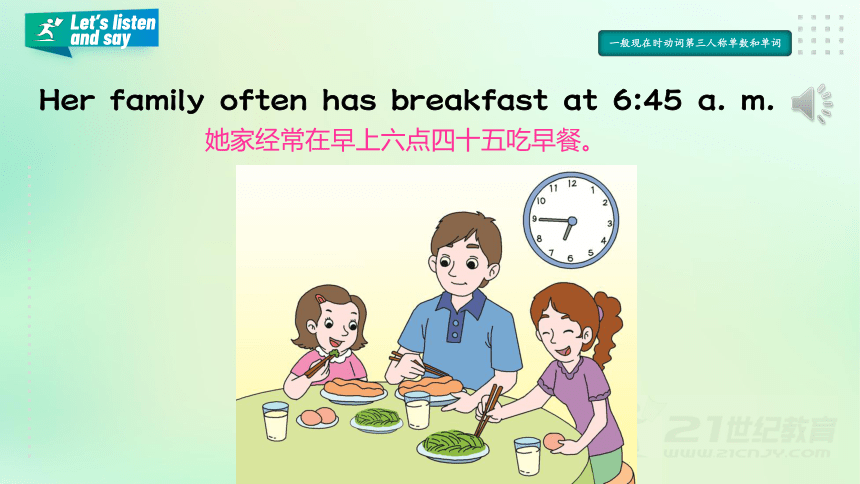
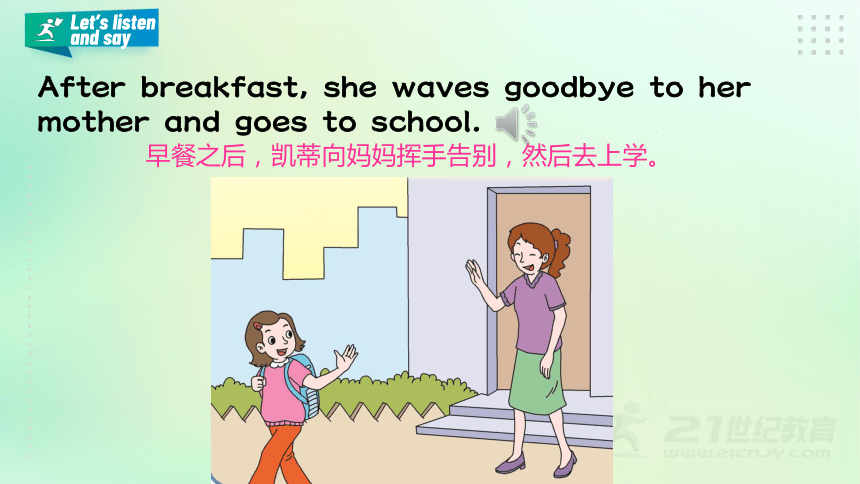
文档简介
(共22张PPT)
英语
第二单元
湘少版
六年级上
Unit
2
Katie
always
gets
up
early
凯蒂总是很早起床。
always
总是;一直
get→gets
get的第三人称单数形式:gets
Talk
about
your
everyday
activities.
Lead-in
I
get
up
at
7:00.
I
eat
breakfast
at
7:30.
I
go
to
school
on
foot.
New
words
总是;一直
经常
挥手
always
/???lwe?z/
a-l-way-s
often
/??fn/
o-ften
wave
/we?v/
wa-ve
New
words
返回
有时
从不
return
/r??t??n/
re-tur-n
sometimes
/?s?mta?mz/
so-me-ti-me-s
never
/?nev?(r)/ne-ver
New
words
在??之后
工作日(除了周末)
after
/?ɑ?ft?(r)
a-f-ter
weekday
/?wi?kde?/
wee-k-day
Let’s
listen
and
say
凯蒂总是很早起床。在平日,她总是在早上六点半起床。
短语和单词
Katie’s
day.
Katie
always
gets
up
early.
On
weekdays,
she
always
gets
up
at
6:30
a.
m.
Let’s
listen
and
say
她家经常在早上六点四十五吃早餐。
一般现在时动词第三人称单数和单词
Her
family
often
has
breakfast
at
6:45
a.
m.
Let’s
listen
and
say
早餐之后,凯蒂向妈妈挥手告别,然后去上学。
After
breakfast,
she
waves
goodbye
to
her
mother
and
goes
to
school.
Let’s
listen
and
say
凯蒂下午五点回家。她经常在晚饭前做作业。晚饭后她与她的爸爸下象棋。
Katie
returns
home
at
5:00
p.m.
She
often
does
her
homework
before
dinner.
She
plays
chess
with
her
father
after
dinner.
Let’s
learn
挥手告别
上学迟到
做家庭作业
always
often
sometimes
never
do
her
homework
wave
goodbye
be
late
for
school
Let’s
learn
看报纸
下象棋
散步
take
a
walk
read
a
newspaper
play
chess
Let’s
practise
Peter
always
gets
up
at
7:00
a.m.
Group
work.
Talk
about
Peter’s
activities.
always
often
sometimes
never
gets
up
at
7:00
a.m.
goes
to
school
by
bus
does
his
homework
before
dinner
watches
TV
at
7:00
p.m.
is
late
for
school
goes
to
bed
at
10:00
p.m.
John
is
an
old
scientist.
He
studies
birds.
He
always
gets
up
very
early.
He
likes
to
listen
to
birds’
singing.
He
often
walks
in
the
forests
and
finds
new
birds.
Sometimes
he
takes
photos
of
them.
He
can
draw
very
well.
He
often
draws
nice
pictures
of
birds,
old
and
young,
big
and
small.
He
never
hurts
them.
Yesterday,
he
saw
a
few
beautiful
birds.
They
sang
very
well.
He
could
not
name
them.
Now
he
is
waiting
for
them
to
come
again.
He
is
going
to
observe
them
and
take
photos
of
them.
Let’s
read
A
few,
is
going
to知识点
Likes,
well知识点
Let’s
read
Answering
the
questions.
1.What
does
John
do?
He
is
.
2.What
does
John
study?
He
studies
_
__.
3.What
did
he
see
yesterday?
He
_
.
4.What
is
he
going
to
do
today?
an
old
scientist
birds
saw
a
few
beautiful
birds
He
is
going
to
observe
the
beautiful
birds
and
take
photos
of
them.
Let’s
write
Word
Bank
go
to
school
by
taxi
write
stories
listen
to
music
read
stories
play
games
help
my
parents
Fill
in
the
blanks.
I
always
__________.
I
often
__________.
I
sometimes
_
____.
I
never
.
help
my
parents
listen
to
music
read
stories
go
to
school
by
taxi
Let’s
have
fun
The
nail
says,
“I
feel
nice.
I
love
my
shell.
When
I
see
mice,
I
go
into
my
shell.
I
always
carry
my
house
about.”
The
birds
says,
“I’m
always
free!
I’m
never
sad!
I
like
the
tree.
Resting
on
my
nest
is
not
bad.”
Language
points
Katie
always
gets
up
early.
On
weekdays,
she
always
gets
up
at
6:30
a.
m.
Katie’s
day.
Katie’s
day.
凯蒂的一天。
Katie’s的意思是“凯蒂的”,其中“’s”是名词的所有格形式。
always是频度副词,意为“总是,一直”,表示事情或动作发生的频率。
常常放在行为动词之前,be动词或情态动词的后面。
频度副词
词义
大致发生的频率
always
总是
100%
usually
通常
80%
often
经常
60%
sometimes
有时
30%
never
从不
0%
on表示“在具体的某一天”。
at表示“在具体的某时刻”。
Language
points
Her
family
often
has
breakfast
at
6:45
a.
m.
family意为“家人,家庭”。当作为一个整体,意为“家庭”时,做主语谓语动词用单数形式。
当强调家庭的各个成员时,谓语动词用复数形式。
●动词第三人称单数的变化规则:
⑴一般的在动词末尾加s.
如:get→gets
run→runs
make→makes
work→works
⑵以“s”,“x”,“ch”,“sh”,或“o”结尾的,加es.
如:wash→washes
go→goes
⑶以辅音字母加y结尾的动词,改y为i,再加es.
如:fly→flies
study→studies
⑷特殊变化,如:have→has
一般现在时表示通常性、规律性、习惯性、真理性(即事实)的动作或状态,或者动作有时间规律发生的事件的一种时间状态。当主语是第三人称单数的时候,谓语动词也要用第三人称单数形式。
Language
points
He
likes
to
listen
to
birds’singing.
He
can
draw
very
well.
like
to
do和like
doing只有释义上有区别:
like
to
do多表示“一时喜欢”。
like
doing多表示“经常喜欢”。
在本句中well是副词,意为“很好地”,修饰draw。
well还可以作形容词,意为“健康的;良好的”。
例:她身体很好。
She
is
very
well.
Language
points
Yesterday,
he
saw
a
few
beautiful
birds.
few/a
few用来修饰可数名词,few表示否定意义,意为“没有,几乎没有”;
a
few表示肯定意义,意为“有几个”。
He
is
going
to
observe
them
and
take
photos
of
them.
a
few意为“一些”,常用来修饰可数名词复数。
be
going
to结构为一般将来时的基本句型,表示将要发生的动作或存在的状态。
例:我打算去购物。
I
am
going
to
go
shopping.
英语
第二单元
湘少版
六年级上
Unit
2
Katie
always
gets
up
early
凯蒂总是很早起床。
always
总是;一直
get→gets
get的第三人称单数形式:gets
Talk
about
your
everyday
activities.
Lead-in
I
get
up
at
7:00.
I
eat
breakfast
at
7:30.
I
go
to
school
on
foot.
New
words
总是;一直
经常
挥手
always
/???lwe?z/
a-l-way-s
often
/??fn/
o-ften
wave
/we?v/
wa-ve
New
words
返回
有时
从不
return
/r??t??n/
re-tur-n
sometimes
/?s?mta?mz/
so-me-ti-me-s
never
/?nev?(r)/ne-ver
New
words
在??之后
工作日(除了周末)
after
/?ɑ?ft?(r)
a-f-ter
weekday
/?wi?kde?/
wee-k-day
Let’s
listen
and
say
凯蒂总是很早起床。在平日,她总是在早上六点半起床。
短语和单词
Katie’s
day.
Katie
always
gets
up
early.
On
weekdays,
she
always
gets
up
at
6:30
a.
m.
Let’s
listen
and
say
她家经常在早上六点四十五吃早餐。
一般现在时动词第三人称单数和单词
Her
family
often
has
breakfast
at
6:45
a.
m.
Let’s
listen
and
say
早餐之后,凯蒂向妈妈挥手告别,然后去上学。
After
breakfast,
she
waves
goodbye
to
her
mother
and
goes
to
school.
Let’s
listen
and
say
凯蒂下午五点回家。她经常在晚饭前做作业。晚饭后她与她的爸爸下象棋。
Katie
returns
home
at
5:00
p.m.
She
often
does
her
homework
before
dinner.
She
plays
chess
with
her
father
after
dinner.
Let’s
learn
挥手告别
上学迟到
做家庭作业
always
often
sometimes
never
do
her
homework
wave
goodbye
be
late
for
school
Let’s
learn
看报纸
下象棋
散步
take
a
walk
read
a
newspaper
play
chess
Let’s
practise
Peter
always
gets
up
at
7:00
a.m.
Group
work.
Talk
about
Peter’s
activities.
always
often
sometimes
never
gets
up
at
7:00
a.m.
goes
to
school
by
bus
does
his
homework
before
dinner
watches
TV
at
7:00
p.m.
is
late
for
school
goes
to
bed
at
10:00
p.m.
John
is
an
old
scientist.
He
studies
birds.
He
always
gets
up
very
early.
He
likes
to
listen
to
birds’
singing.
He
often
walks
in
the
forests
and
finds
new
birds.
Sometimes
he
takes
photos
of
them.
He
can
draw
very
well.
He
often
draws
nice
pictures
of
birds,
old
and
young,
big
and
small.
He
never
hurts
them.
Yesterday,
he
saw
a
few
beautiful
birds.
They
sang
very
well.
He
could
not
name
them.
Now
he
is
waiting
for
them
to
come
again.
He
is
going
to
observe
them
and
take
photos
of
them.
Let’s
read
A
few,
is
going
to知识点
Likes,
well知识点
Let’s
read
Answering
the
questions.
1.What
does
John
do?
He
is
.
2.What
does
John
study?
He
studies
_
__.
3.What
did
he
see
yesterday?
He
_
.
4.What
is
he
going
to
do
today?
an
old
scientist
birds
saw
a
few
beautiful
birds
He
is
going
to
observe
the
beautiful
birds
and
take
photos
of
them.
Let’s
write
Word
Bank
go
to
school
by
taxi
write
stories
listen
to
music
read
stories
play
games
help
my
parents
Fill
in
the
blanks.
I
always
__________.
I
often
__________.
I
sometimes
_
____.
I
never
.
help
my
parents
listen
to
music
read
stories
go
to
school
by
taxi
Let’s
have
fun
The
nail
says,
“I
feel
nice.
I
love
my
shell.
When
I
see
mice,
I
go
into
my
shell.
I
always
carry
my
house
about.”
The
birds
says,
“I’m
always
free!
I’m
never
sad!
I
like
the
tree.
Resting
on
my
nest
is
not
bad.”
Language
points
Katie
always
gets
up
early.
On
weekdays,
she
always
gets
up
at
6:30
a.
m.
Katie’s
day.
Katie’s
day.
凯蒂的一天。
Katie’s的意思是“凯蒂的”,其中“’s”是名词的所有格形式。
always是频度副词,意为“总是,一直”,表示事情或动作发生的频率。
常常放在行为动词之前,be动词或情态动词的后面。
频度副词
词义
大致发生的频率
always
总是
100%
usually
通常
80%
often
经常
60%
sometimes
有时
30%
never
从不
0%
on表示“在具体的某一天”。
at表示“在具体的某时刻”。
Language
points
Her
family
often
has
breakfast
at
6:45
a.
m.
family意为“家人,家庭”。当作为一个整体,意为“家庭”时,做主语谓语动词用单数形式。
当强调家庭的各个成员时,谓语动词用复数形式。
●动词第三人称单数的变化规则:
⑴一般的在动词末尾加s.
如:get→gets
run→runs
make→makes
work→works
⑵以“s”,“x”,“ch”,“sh”,或“o”结尾的,加es.
如:wash→washes
go→goes
⑶以辅音字母加y结尾的动词,改y为i,再加es.
如:fly→flies
study→studies
⑷特殊变化,如:have→has
一般现在时表示通常性、规律性、习惯性、真理性(即事实)的动作或状态,或者动作有时间规律发生的事件的一种时间状态。当主语是第三人称单数的时候,谓语动词也要用第三人称单数形式。
Language
points
He
likes
to
listen
to
birds’singing.
He
can
draw
very
well.
like
to
do和like
doing只有释义上有区别:
like
to
do多表示“一时喜欢”。
like
doing多表示“经常喜欢”。
在本句中well是副词,意为“很好地”,修饰draw。
well还可以作形容词,意为“健康的;良好的”。
例:她身体很好。
She
is
very
well.
Language
points
Yesterday,
he
saw
a
few
beautiful
birds.
few/a
few用来修饰可数名词,few表示否定意义,意为“没有,几乎没有”;
a
few表示肯定意义,意为“有几个”。
He
is
going
to
observe
them
and
take
photos
of
them.
a
few意为“一些”,常用来修饰可数名词复数。
be
going
to结构为一般将来时的基本句型,表示将要发生的动作或存在的状态。
例:我打算去购物。
I
am
going
to
go
shopping.
同课章节目录
- Unit 1 What did you do during the holidays?
- Unit 2 Katie always gets up early.
- Unit 3 I like my compute
- Unit 4 The Mid-Autumn Festival is coming...
- Unit 5 It will be sunny and cool tomorrow
- Unit 6 I will bring a big bottle of orange juice
- Unit 7 What can I do?
- Unit 8 We shouldn't waste wate
- Unit 9 This bird is bigger than fist one...
- Unit 10 I don't feel well today
- Unit 11 Shall we go to the theatre?
- Unit12 It's Christmas again!
